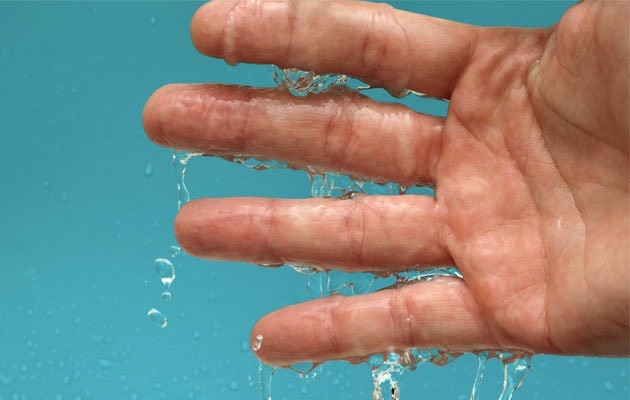Ideal Dermatology Approaches for Sweaty Hands Treatment: Tips and Techniques
Ideal Dermatology Approaches for Sweaty Hands Treatment: Tips and Techniques
Blog Article
Understanding the Root Reasons of Excessive Sweating and Its Influence on Life
Extreme sweating, additionally referred to as hyperhidrosis, is a condition that impacts a substantial section of the population, yet its underlying causes and ramifications on day-to-day functioning remain somewhat enigmatic. While it is frequently recognized as a physical response to regulate body temperature, the triggers for extreme sweating can differ commonly amongst people, incorporating not just physical variables but psychological and likewise emotional aspects. Additionally, the effect of this condition prolongs past simple pain, commonly affecting social communications and general high quality of life. By diving right into the origin of hyperhidrosis and exploring its multifaceted results, a much deeper understanding of this prevalent problem can be acquired, clarifying the complexities that individuals facing too much sweating navigate each day.
Physiology of Sweat Glands
The guideline of sweat manufacturing, an important physical process, is mostly regulated by the activity of sweat glands distributed throughout the human body. Sweat glands are categorized into 2 major types: eccrine and apocrine glands.
When the body temperature level climbs, either due to exercise, high temperature levels, or emotional anxiety, the nervous system activates the gland to produce sweat. This sweat is composed mostly of water and electrolytes like salt and chloride. The procedure of sweat production is necessary for keeping the body's internal temperature within a narrow, optimum array, highlighting the crucial function gland play in human physiology.
Triggers for Excessive Sweating
In recognizing the root causes of extreme sweating, it is vital to identify the triggers that can cause this physical feedback. Too much sweating, also called hyperhidrosis, can be triggered by different aspects, both ecological and physiological. One typical trigger is psychological anxiety or stress and anxiety, which can promote the body's gland to create more sweat than is needed for cooling. Physical effort, high temperatures, and spicy foods are likewise understood to activate extreme sweating in individuals prone to this condition. Furthermore, certain medical problems like hyperthyroidism, diabetes, or menopause can add to excessive sweating too.
In addition, medicines such as some antidepressants, opioids, and certain supplements can additionally function as triggers for hyperhidrosis. Understanding these triggers is essential in handling extreme sweating effectively - Sweaty hands treatment. By identifying and addressing the details triggers that trigger excessive sweating in a private, doctor can create individualized therapy plans to ease this condition and boost the individual's top quality of life
Medical Issue Associated
Related to excessive sweating are numerous medical conditions that can aggravate this physical response. One typical problem is hyperhidrosis, a condition defined by abnormally enhanced sweating that goes beyond the body's thermoregulatory demands. This can manifest in focal areas like the hands, soles, underarms, or face, influencing a person's quality of life because of social humiliation and pain.
Additionally, endocrine conditions such as hyperthyroidism, diabetic issues, and menopausal hot flashes can likewise result in extreme sweating. Hyperthyroidism triggers an overproduction of thyroid hormones, accelerating metabolism and triggering sweating. Diabetes can generate sweating episodes, specifically throughout hypoglycemic episodes when blood glucose levels drop too reduced. Menopausal warm flashes, associated to hormonal fluctuations throughout menopause, can create intense and sudden sweating, frequently accompanied by flushing and heart palpitations.
Furthermore, infections like tuberculosis, HIV, and endocarditis have been connected with evening sweats, a common signs and symptom understood to disrupt rest and impact total wellness. These medical problems highlight the diverse series of underlying elements that can add to too much sweating, requiring comprehensive analysis and administration by healthcare experts.
Emotional and Emotional Factors

Influence On Social Interactions
Too much sweating can have profound results on an individual's capacity to engage comfortably in check over here social communications. The visible indicators of sweat stains or damp spots on clothes can bring about embarrassment and self-consciousness, creating individuals to take out from social scenarios. This withdrawal can affect partnerships, limitation social tasks, and hinder professional and personal development.

In addition, the stress and anxiety and self-worth problems originating from extreme sweating can impact interaction and interpersonal skills. People might struggle to concentrate on discussions, join team tasks, or share themselves with confidence. This can bring about feelings of seclusion and loneliness, as social connections become challenging to maintain.
Conclusion

While it is frequently comprehended as a physiological response to manage body temperature, the triggers for excessive sweating can find differ widely among people, incorporating not just physical factors however psychological and additionally psychological aspects. By diving right into the root causes of hyperhidrosis and discovering its complex impacts, a much deeper understanding of this prevalent concern can be acquired, losing light on the complexities that individuals grappling with extreme sweating navigate on a day-to-day basis.
Physical effort, high temperatures, and spicy foods are likewise known to cause extreme sweating in people susceptible to this problem. By determining and addressing the details triggers that prompt too much sweating in an individual, medical care carriers can establish tailored treatment strategies to reduce this problem and improve the person's top quality of life.
Extreme sweating can have extensive effects on an individual's capacity to engage easily in social communications.
Report this page